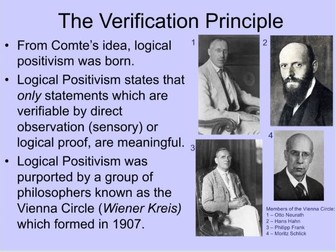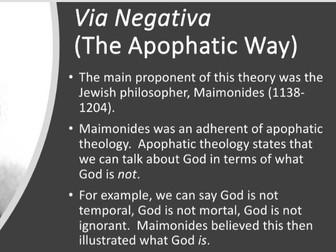The Verification and Falsification Principles
<p>PowerPoint outlining the key points of the Verification Principle and the Falsification Principle (27 slides with key information).</p>
<ul>
<li>A.J. Ayer’s argument and criticisms</li>
<li>Antony Flew’s argument (including John Wisdom’s ‘Parable of the Gardener’) and criticisms</li>
</ul>
<p>Criticisms:</p>
<ul>
<li>Richard Swinburne ’ ‘The Toys in the Cupboard’</li>
<li>R.M. Hare ‘The Paranoid Student’</li>
<li>John Hick ‘Eschatological Verification’</li>
<li>Basil Mitchell ‘The Analogy of the Stranger’</li>
</ul>

